

17.09.2025
1433
What are the advantages? Working in Dubai is a dream for many Russians. The main reasons are the high standard of living in the emirates, decent pay for skilled labour, and the absence of taxes. Within a few years, it is quite possible to save a considerable sum and return home with money, if, of course, that was the original plan.
What to pay attention to? Finding work in Dubai is not particularly difficult, especially for a highly qualified specialist with a verified diploma. However, when considering relocation, one should still take into account the specifics of living in the UAE.
The UAE is known for its hospitality towards foreigners and has long been considered an ideal holiday destination. However, not all Russians dream only of carefree beach leisure. Many of them strive to find a good job in Dubai.
For foreign citizens seeking to work in one of the world's most prosperous countries, the most favourable conditions and significant privileges have been created. They are granted numerous opportunities in everyday life that might be considered unacceptable in traditional Muslim society.
However, this does not imply an absence of restrictions: requirements for compliance with social norms, traffic rules and generally accepted etiquette are quite strict. Violations are subject to severe fines, possible criminal prosecution and deportation. So, before looking for work in Dubai, you should consider such things.
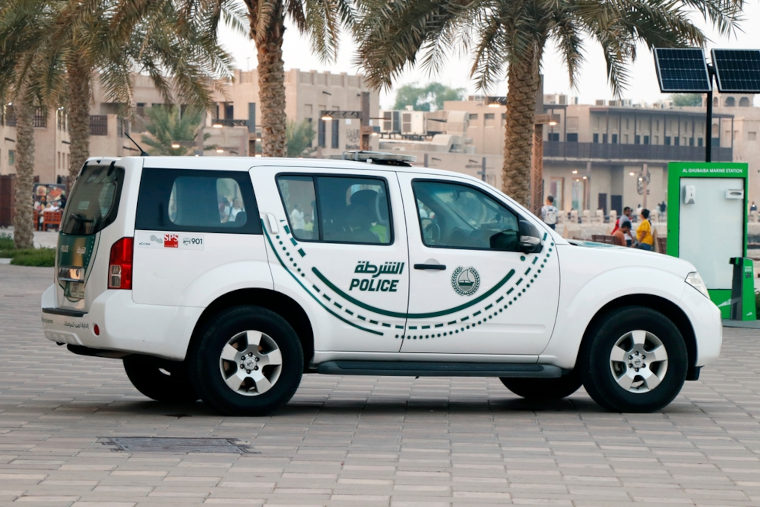 Image source: Libin Jose / shutterstock.com
Image source: Libin Jose / shutterstock.com
Let's examine the key aspects of local culture.
Drinking alcoholic beverages in public places is strictly prohibited. However, tourists and representatives of non-Muslim faiths can consume alcohol in bars, cafés or their hotel rooms. Afterwards, they should use a taxi to return home.
For working in Dubai, women should consider the dress code etiquette. European women can wear regular dresses, but with certain conditions: they should not be too tight, short, or have deep necklines. Also, outfits cannot expose the midriff or display underwear.
Sunbathing in bikinis is only allowed in restricted access areas, but even there, going topless is strictly forbidden. On public beaches, dress code rules imply certain modesty; leaving them in swimwear is prohibited.
There are fines for non-compliance with these norms, but usually, police officers limit themselves to verbal warnings and advise women to change their attire.
Law enforcement agencies closely monitor compliance with traffic rules and strictly punish any violations. It is forbidden to exceed the speed limit, smoke or talk on the phone whilst driving, throw rubbish from the window, stop on the road without reason, or transport children under the age of 10 without a special seat.
For serious violations such as running a red light, speeding, or occupying the oncoming lane, driving licences are revoked.
It is not customary to behave loudly in the streets, for example, to talk loudly, laugh or shout. Threatening or indecent gestures towards others are prohibited. Such actions are considered a violation of public order and can lead to fines, and in some cases, detention.
During Ramadan, Muslims observe fasting from dawn to sunset, abstaining from food and drinks. Although pregnant and nursing women, as well as ill people may break these rules. Non-Muslims need to respect this custom, but they can quietly eat and drink in restaurants closed from public view. Chewing gum on the street is forbidden; this rule applies to everyone.
Public display of affection is under strict control. Even spouses cannot demonstrate romantic feelings on the street; they are only permitted to hold hands. Homosexual relationships are a crime that can lead to imprisonment for up to 10 years.
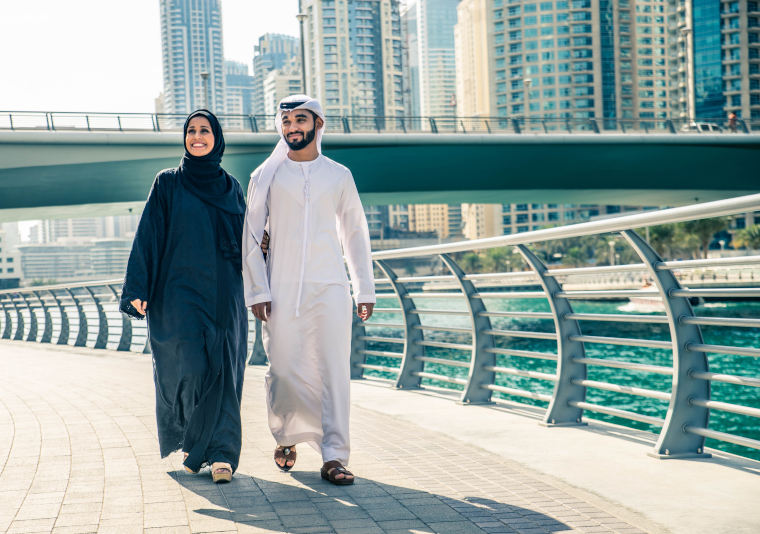 Image source: oneinchpunch / shutterstock.com
Image source: oneinchpunch / shutterstock.com
In Arab countries, one should exercise particular caution when taking photographs. Photographing people without their consent, especially women and those who are praying, is unacceptable. Additionally, it is forbidden to take pictures of mosques, military facilities and government buildings.
In the United Arab Emirates, strict norms have been established restricting freedom of expression on the internet. Thus, it is forbidden to criticise the government or sheikhs, spread negative information about the country and publish images of negative events such as fires or riots.
The UAE authorities aim to maintain a positive image of the country, and non-compliance with these norms can lead to serious sanctions, including fines or even deportation.
Working in Dubai does not require mandatory language understanding, but knowledge of English is extremely important. If interaction with government institutions, police, or judicial bodies is expected, knowledge of the state language is indispensable: communications there are conducted in Modern Standard Arabic (MSA).
Therefore, if you plan to settle in the UAE for a long time, it is recommended to take courses to master at least basic communication skills.
In recent years, it can be observed that society, especially the younger generation, has become more liberated. Young people now adhere much less to strict traditional norms and use the achievements of civilisation with greater enthusiasm. However, the general direction and lifestyle are still set by respected representatives of the older generation.
Working in Dubai is attractive for Russians for many reasons:
Working in Dubai can be tempting, but certain nuances need to be considered. If you decide to terminate the contract early, serious consequences may await you. The authorities can impose a ban on work activities for 6 months, and for repeated violations — for a whole year. In rare cases, you may face a lifetime ban on working in the UAE.
 Image source: SaiArLawKa2 / shutterstock.com
Image source: SaiArLawKa2 / shutterstock.com
It's important to remember that Dubai is very hot, which is unusual for many people. You also need to observe Muslim customs. However, respecting local laws and traditions is important wherever you are.
To get a good job in Dubai in 2024, you need to meet certain requirements. The key factor for Russian-speaking workers in Dubai is knowledge of English. Good command of it opens up many opportunities for jobseekers, significantly expanding career position choices.
Even if you only have basic English knowledge, you can still find work, but the conditions will be less favourable, and the salary may be lower. This emphasises the importance of language proficiency for career success. The better your English, the more chances you have of getting the desired position and good remuneration.
Most companies prefer young employees aged 18 to 30. For experienced specialists, the age threshold is slightly higher — up to 35–40 years. Companies rarely hire people older than 45–55 years; this usually happens only when dealing with highly qualified professionals with exceptional skills.
If you are a highly qualified doctor and want to work in Dubai, you need to verify your diploma. Medicine in the UAE is of a high standard, and the selection of specialists is very strict. To get a job in a clinic, you need to pass an exam, prove your experience and education, and be fluent in English.
Many professions that involve working with people, such as salespeople, waiters, and managers, require employees to have a pleasant appearance. Therefore, during interviews, employers often pay attention to how the candidate looks.
First, you need to prepare a CV where you indicate personal information and education. Recommendation letters from previous companies will be an additional advantage, especially if said companies worked in Dubai. You can look for a job search independently or turn to recruitment agencies that specialise in employment in the city.
To get a job in Dubai, you can look at advertisements in local newspapers and magazines, as well as on specialised websites such as Dubizzle, DubaiJobs and Dubai Duty Free.
 Image source: fizkes / shutterstock.com
Image source: fizkes / shutterstock.com
To increase your chances of securing a job vacancy in Dubai with better conditions and salary, it's worth submitting your CV to several companies at once. This provides an opportunity to compare offers, meet potential employers and avoid paying intermediary fees. However, this approach requires self-financing of trips and accommodation.
It's important to remember that most employers in the UAE prefer personal interviews, so remote searches are often less effective.
These companies have an extensive database of candidates and effectively advertise their services, attracting attention from both jobseekers and employers. They employ experienced specialists who are well-versed in labour legislation and UAE traditions. The most well-known recruitment agencies are DOGLOBAL, Job Travel Possible and Global Vision.
For employment in Dubai, you need a work visa; a tourist visa won't suffice. However, you can come to the UAE as a tourist and look for vacancies. If you find a suitable position, you can discuss obtaining a work visa with management right on the spot.
The employer is fully responsible for the visa acquisition process; you only need to fill out an application form in English, provide a passport copy and two colour photographs.
It takes two to three weeks to obtain the necessary document. After the process is complete, you will receive a notification via email. You will then need to print the document you received on a colour printer and present it to the customs inspector when crossing the border. The document is valid for 60 days.
Once you arrive, you need to obtain a resident visa. The processing takes approximately one month. To get the visa, the employer must send your original passport, diploma (if required) and employment contract to the immigration service.
Importantly, the company pays for medical examinations, including tests for hepatitis and HIV, chest X-ray, and for women — a pregnancy test. When you receive your resident visa, you are also issued a plastic ID card. It serves as identification. The visa is valid for three years, but your employer can extend it if necessary.
 Image source: voronaman / shutterstock.com
Image source: voronaman / shutterstock.com
People usually come to the Emirates for work, getting employed by local companies. But there are other ways to obtain residence permits, not necessarily related to employment.
Golden Visa is a special visa that allows foreigners to live and work in the country for 5 or 10 years.
It's usually obtained by investors who have invested at least $545,000 in real estate, entrepreneurs, talented students and graduates, activists, scientists, inventors, high-level specialists, cultural and artistic figures, researchers with a master's degree or higher, and highly qualified professionals with higher education.
Green Visa is a visa that gives the right to stay in the country and work for 2 to 5 years. It can be obtained by:
Thus, this type of visa is available for different categories of people who want to live and work in the UAE.
Visa for elderly (for those over 55 years old). To obtain it, one needs to invest at least 545 thousand dollars in real estate or have savings of at least 272 thousand dollars, or receive an active income of at least 5,445 dollars per month.
Job search visa, allowing foreign students with higher education (bachelor's degree) from the world's best universities (from top-500 ranking) to come to the UAE for 60 days to search for work.
To obtain it, one needs to meet certain qualification requirements (first, second or third category according to MoHRE). After the 60-day period ends, one can apply for another visa, for example, work or business.
Annual visa for freelancers who can live in Dubai and work remotely. This is an excellent opportunity for those who want to move to the UAE and continue cooperation with foreign employers.
To obtain the visa, you need to have an annual contract with a salary of at least $5,000 per month and obtain a freelancer licence in one of the UAE's free economic zones. The list of these zones is available on the UAE Ministry of Economy website. Since 2023, visa applications can be submitted online.
In the UAE, labour relations between employer and employee are regulated by a law adopted in 1980. This act differs from European norms; some of its points are stricter, while others provide maximum protection of employee rights. Let's look at the key provisions of this document:
 Image source: fizkes / shutterstock.com
Image source: fizkes / shutterstock.com
If you want to resign voluntarily, you need to notify the employer as specified in the employment contract. But if you’ve been working for less than a year, the company may require compensation for employment costs (for example, document processing and tickets).
Moreover, if management does not approve of your decision to resign, they may prohibit you from seeking new employment for six months to a year. In some cases, for example, if you leave without explaining the reasons, this condition may be lifelong. If you resign by mutual agreement, be sure to request a no objection certificate from the employer.
The United Arab Emirates has long had unique features when it comes to labour legislation, however in recent years there have been notable changes in the Dubai labour market for Russians and other foreigners. In 2022–2023, a major reform was carried out, which introduced a number of cardinal innovations. Let's examine these changes in detail:
Now the working week has been shortened to just four and a half days. This means that people can rest during the second half of Friday, as well as Saturday and Sunday.
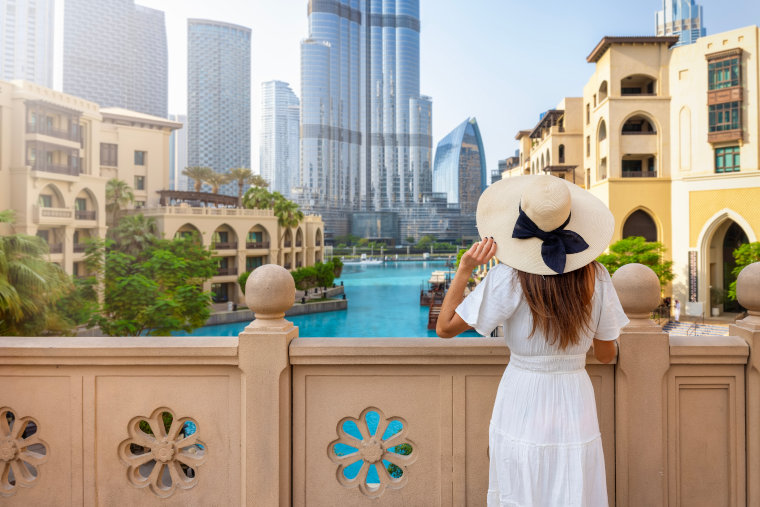 Image source: Sven Hansche / shutterstock.com
Image source: Sven Hansche / shutterstock.com
Initially, this innovation only applied to government organisations, but many private companies decided to follow this example. The number of working hours has also decreased: previously people had to work for 48 hours per week, but now 40 hours is sufficient.
One can work more intensively, for example, complete all tasks in three days and rest for the remaining working days. It is also permitted to choose convenient times. Job sharing between two employees is allowed, as well as working simultaneously for several firms (provided they are not competitors of the current employer).
After this period ends, the contract can be extended if needed. This means there will no longer be indefinite contracts.
Now employers give them an extended period to find a new job (180 days, instead of the previous 30). The company must pay compensation within 14 days after dismissal, otherwise it faces a financial penalty. In case of an employee's death, the employer is obligated to reimburse the family for funeral expenses and transportation of the body to their homeland.
Now all specialists must participate in the national social security programme. The insurance scheme works on two principles: for those earning up to 16,000 dirhams (approx. $4,356) per month, and those whose income is higher. The first group has an annual deduction of 60 dirhams (about $16.34), while the second group pays twice that amount.
The maximum payout with lower income is 10,000 dirhams (about $2,725), for the second group the limit is 20,000 dirhams (about $5,450). Workers will not receive insurance payments if they were dismissed for violating labour discipline, resigned voluntarily, transferred to another job or left the country.
High-paying jobs in Dubai for men and women:
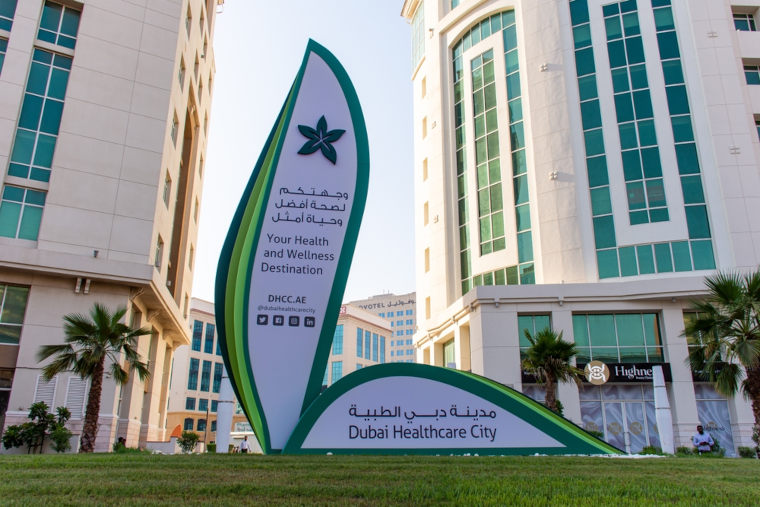 Image source: hamdi bendali / shutterstock.com
Image source: hamdi bendali / shutterstock.com
Previously in the UAE, finding work in the entertainment sector with a good salary was easy. But now competition has increased due to the large number of migrants from India, Pakistan and Bangladesh.
Salary in Dubai consists of two parts: a fixed base rate and additional payments. The first is the basic income, which is specified in the employment contract and guarantees a certain amount of money for your work.
You can also receive additional payments, for example, for using a personal phone/transport, for housing rent, for meals, etc. Which of these will be available to you depends on the company you work for. These conditions are discussed separately upon hiring.
A number of organisations have a bonus system, which serves as an additional incentive for employees. The bonus amount usually depends on how significant the employee's contribution is to the company's financial results.
The more management needs their efforts, the higher the reward can be. Allowances can have different bases: for personal achievements, team successes, completion of specific tasks, or even an annual holiday bonus. Usually, the bonus size varies from 3% to 5% of monthly income.
The size of bonuses that employees receive depends on which industry they work in. In construction, transport and hospitality, bonuses are typically low. Workers in IT, healthcare, insurance, customer service and HR receive medium bonuses. The highest allowances are in finance, architecture, business development, marketing, and sales.
 Image source: fizkes / shutterstock.com
Image source: fizkes / shutterstock.com
If an organisation in Dubai officially employs a Russian-speaking or foreign specialist, it is obligated to cover all related expenses, such as work visa processing, medical insurance payment, and paid leave in accordance with UAE legislation.
In the UAE income, as in other countries, depends on several factors. The level of professional skills and experience, as well as the industry in which you work, are all important. The income can also be influenced by your citizenship and knowledge of foreign languages.
In other words, lack of knowledge limits earning opportunities. This is especially relevant for those who don't speak English. To receive decent remuneration, you need to have high qualifications and speak English fluently, preferably at C1 level.
In the UAE, there is no fixed minimum salary, but foreigners usually receive from 2,000 to 4,000 dirhams per month. But to live in the Emirates you need about 4,000 dirhams, without considering rent. If the salary is below this amount, the employer may compensate for the difference by providing free meals and accommodation.
In the UAE, the starting salary for experienced specialists starts at 8,000 dirhams. If a candidate has a higher education diploma legalised by the UAE ministry, their income can reach 16,000 dirhams.
In this country, the average salary is approximately 20,000 dirhams per month. To better understand how typical salaries look in different professions, let's look at a few examples. We'll compare the annual income of specialists without experience in the field and professionals with additional certificates.
Chief accountants in small and medium businesses can earn from 246,000 to 410,000 dirhams per year.
Financial analysts earn from 176,000 to 300,000 dirhams.
Credit managers — from 250,000 to 375,000.
IT managers with over 10 years of experience can earn from 390,000 to 720,000 dirhams per year.
IT administrators — from 157,000 to 370,000.
Project and programme managers earn from 375,000 to 550,000 dirhams.
HR managers — from 300,000 to 500,000.
Legal counsels with 3 to 5 years of experience earn from 310,000 to 350,000 dirhams per year.
Taxi drivers earn from 4,000 to 6,000 dirhams per month.
Waiters — from 1,500 to 2,500 dirhams.
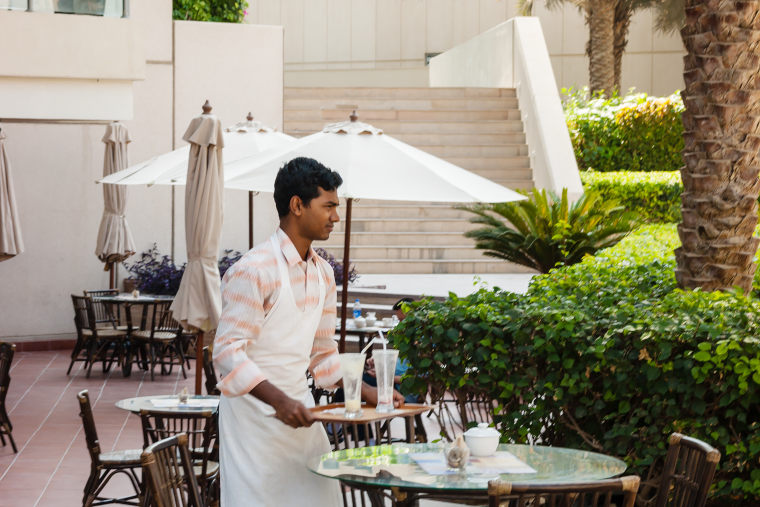 Image source: Laborant / shutterstock.com
Image source: Laborant / shutterstock.com
Housekeepers — from 2,000 to 4,000 dirhams.
Security guards and electricians receive income in the same range — from 1,500 to 4,000 dirhams per month.
The UAE aims to attract foreign specialists, therefore it was decided not to introduce income tax for individuals. This means that foreigners working in Dubai do not pay income tax.
Additionally, they are exempt from taxes on various types of income, such as interest, royalties, dividends, wealth, inheritance, gifts, and capital gains. Foreigners with resident visas are also not subject to pension taxation.
Although there is no car tax, there is a registration fee that must be paid once when purchasing a vehicle ($100–$150 depending on the emirate).
In 2023 the UAE has introduced a corporate income tax for companies earning more than 375,000 dirhams per year (about $102,000). The rate is 9%. For foreign organizations engaged in oil and gas extraction, the figure is higher — 55%; for branches of foreign banks — 20%.
Furthermore, all enterprises with income above the specified threshold must pay VAT at 5%. No business tax is levied from other companies, making the UAE an attractive place for opening offices.
The UAE takes illegal work very seriously. If a foreigner works without permission, they can be arrested for several months and deported. For each day of work without a visa, they will have to pay a fine of 100 dirhams ($30). If not paid, the person will be deported and banned from entering the UAE for 3 years. This can make it difficult to obtain a visa later, even a tourist one.
 Image source: Wikamol D / shutterstock.com
Image source: Wikamol D / shutterstock.com
In the UAE, employers providing illegal work also bear responsibility. They pay a fine of about $100,000, and can also be sentenced to two months of imprisonment by court decision.
To work in Dubai, a work visa is mandatory. A tourist visa or entry permit does not give the right to work. Without a work visa, employment is illegal and can lead to serious consequences for both you and your employer.
There is no official minimum wage in the UAE. However, in Dubai, it is believed that the minimum salary should be around 4,800 dirhams, which is approximately equal to $1,300. But in reality, the salary size depends on the agreement between the specialist and the employer.
For a whole month of living with a family, you will need from $7,000 to $15,000. This amount includes expenses for housing, food, transport, electricity and gas, as well as entertainment.
The more experience a candidate has in a particular field, the higher their salary. For example, people with 2 to 5 years of experience receive 35% more than beginners. After 10 years of work, pay increases by another 20%, and after 15 years — by another 15%. In other words, the longer a person works in their profession, the higher their income.
There is clear inequality in the distribution of high-paying positions in the labour market. Europeans, Americans and residents of the former USSR most often occupy management positions and have high incomes. While people from Africa and Asia mostly work in the service sector, receiving significantly less. There is also a tendency towards national preferences in hiring.
For example, Indians and Pakistanis have proven themselves well in IT, finance, construction and repair, and servicing high-tech industries. Africans and Filipinos, thanks to their reliability, peacefulness and excellent knowledge of English, most often work in customer service.
Employers in Dubai offer employees both good pay and attractive bonuses, such as medical insurance or paid leave.
However, the most valuable thing for many is the very opportunity to live in the UAE. For this, people are willing to put up with some inconveniences, such as rising prices and lower salaries in certain professions. But they still get the opportunity to enjoy all the advantages of life in the UAE, such as comfortable climate, high level of security and numerous entertainment options.
Article header image source: fizkes / shutterstock.com